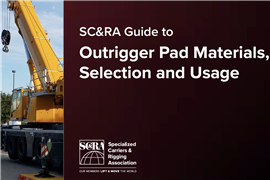Interview: Leading The Way Alimak Hek
11 April 2017

Rolf Persson, Alimak Hek managing director, and Alimak Group head of global manufacturing.
One may not imagine that a remote town in the wilds of northern Sweden would be the manufacturing base for the world’s biggest provider of rack and pinion hoists, and now traction lifts.
Skellefteå is more or less on the same latitude as Iceland; and while saved from the most extreme cold by the Gulf Stream it still experiences winter conditions of around -20 degrees Fahrenheit.
Never daunted, Alimak Hek pioneered rack and pinion solutions in this very town, having first started production back in 1948 and it celebrates its 70th anniversary next year.
It is now headquartered in Stockholm, but its main production plant is in Skellefteå where I sit down to talk to Rolf Persson, Alimak Hek managing director since October 2007, and head of global manufacturing of Alimak Group for the last four years.
The company’s manufacturing footprint also includes 12600 square metres across two plants in Changshu, China. Three years ago Alimak Hek acquired Norway-based Heis-Tek, a specialist in traction lifts, a technology that it has now brought to Skellefteå. This will result in a full traction range to be launched this year.
Mr Persson, says, “We see that customers are asking for rack and pinion and traction. In the past we could not provide them with the option for traction, but now we can.”
That range will be from 300kg capacity to 5 tonnes and offer non-explosion proof and explosion proof models. This extensive series of models will also be standard for the global market; currently Heis-Tek’s produces high-end explosion proof products for the European market, but does not hold the UL standard for the US market. All that will change once the new middle range traction line is launched under the Alimak Hek name, while Heis-Tek will continue to trade with its traditional high-end products.
The company claims to have 55% global market share of industrial elevators and is very strong too in construction hoists with more than 50% share in Western Europe, North America and Australia. “We are also increasing our market share dramatically in many other countries because now we have a greater range than before,” explains Mr Persson.
To achieve this, the company developed a new mid-market construction hoist three years ago – the SC45/30 and SC65/32 - which is produced in China and has been a big success domestically and in India, wider Asia and the Middle East, as well as South America.
The European version is manufactured in Europe under the Scando brand, rather than SC, and has CE Marking. This principle remains true across the range, with construction hoists and industrial lifts heading to Europe, North America, Australia, Russia, with some to the Middle East, all produced in Skellefteå.
In China, the company already produces a larger number of products but the unit values are considerably lower than products made in Skellefteå.
“We could sell much more in China than we do today, but payment terms are extremely tough in China,” says Mr Persson. “They like to have open credit for many months and sometimes they cannot pay in the end. Plus it is a tough price level.”
Therefore, the company is choosy who it takes orders from in the country, concentrating its efforts particularly in the wider Asian market and South America.
Changing footprint

On the subject of mast climbing products, all units for the global market are produced in China, with Skellefteå concentrating on construction hoists and industrial lifts - although Alimak’s dominant product is construction hoists, over mast climbers.
The reason being, says Mr Persson, “We have a good production capacity in China, also when we develop a new range of platforms we don’t want to split them up and produce in two places, so we took the decision to choose China.”
Alimak has been restructuring its footprint in recent times and four years ago moved its production line in the Netherlands to the current facilities in China. At the same time, the company ended its production in the US - at the time the biggest rack and pinion producer in America. Actually, Alimak’s first rack and pinion products were produced in 1962, with Hek being acquired in 2001. The aforementioned North America concern, a producer of permanent and construction lifts, then called Champion, was acquired in 2006. “We decided to close that plant as well and move its production to Skellefteå,” says Mr Persson.
Its two current production bases were responsible for a revenue of SEK2.036 billion (US$230 million) in 2015 – the most recent available figures - representing 17% year-on-year growth, and an EBIT of SEK350 million ($39.4 milion). To quote another number, there are 22000 installed Alimak Hek units worldwide.
In 2010, the company broadened its sales efforts in the BRIC countries, with permanent sales and service organisations set up in Brazil and India. There are also 22 sales offices globally and more than 80 distributors, which the company has increased in the last three years from around 30. “That is because we have a much better product portfolio than we had in the past. In the past we didn’t have the portfolio to sell to Africa, for example, but we do today,” explains Mr Persson. “Today we don’t have any plans for production in Brazil or India, or anywhere else, the footprint we have works very well.”
In 2014 the launch of mid-market hoists was a breakthrough for company sales in China, with components sourced locally, rather than complete products being delivered from Skellefteå.
Interestingly, in China there is a regulation that after eight years rack and pinion construction hoists have to be scrapped. “So, in that situation they don’t make a design for 25 years. But all the Alimak construction hoists produced in China are designed to last 25 years due to the fact we export a lot from China.”
Then there is the established Alimak premium range. “Every year we are upgrading the premium hoists we produce in Skellefteå for the Scando range. We still have the Alimak Scando 450 and 650, but its upgraded each year.”
Concentrating on the construction division, production includes construction hoists, transport platforms and material hoists with the key end markets being construction and maintenance. The group has more or less four different types of construction hoist, the previously described Scando 450 and 650 produced in Skellefteå, and the SC65/32 and SC45/30 for mid-markets, produced in China for emerging markets. A couple of years ago Skellefteå also started producing two mid-market hoists for Europe, Australia and North America - the Scando 65/32, and Scando 35/30, with all the key components, gear boxes and safety devices manufactured at the plant.
Comprehensive options

Alimak was contracted to the Merseylink Mersey Crossing Joint Venture, to provide construction access to the three concrete pylons of the new suspension bridge in the UK.
They resulted from some customers in these markets desiring the Alimak Hek brand name but requiring a cheaper product. Without this option from Alimak, some customers had chosen Chinese manufactured products instead of those from competitors in Europe. “This new mid-market hoist means we can reduce the costs and the price and fill a gap that we had in the Alimak Group,” comments Mr Persson.
It does not represent a major boost in overall sales but provides an option for smaller rental companies and start-ups with this product type.
The difference between the Scando high-end market and the Scando mid-market is down to the cage. The SC 45, for example, is a fixed 3 m long, 1.4 m wide, with no flexibility on that cage size. It’s a more cost efficient way to produce the cage.
On the other hand, the medium range has all the same components as the premium products. “So it is not a huge difference but we can reduce the costs and price.”
The company also produces a large amount of tailor made solutions, with roughly 30% of production in Skellefteå based on this type of production. The company also offers aftermarket service in more than 90 countries.
Last year Alimak Group sold its US rental business to Bigge Crane and Rigging for $2.4 million.The rental business in the US predated the merger between Alimak and Hek in 1999 and has been operated as a separate unit within the Alimak US operation. The divestment allows a stronger focus on product sales as well as after sales services supporting Alimak´s entire product portfolio in the US and Canada.
Now Alimak Hek’s rental concerns are based primarily in Australia, France and the Benelux. “It’s not a core business. The one we had in the US was very small,” says Mr Persson,“In fact we had a rental fleet in many countries before the decision was taken many years ago to concentrate on those four markets.”
One of the reasons Alimak has little interest in rental is direct competition with itself. “To sell and rent we have a conflict, and sometimes we also compete against our customer as well, and that is not good.”
Group-wide the company has also been busy with acquisitions, having last year acquired wind turbine vertical access specialist Avanti Wind Systems. Avanti is the market leader in its sector with the deal diversifying Alimak Group´s product portfolio, while offering an expansion into a growing area of renewable energy. The company is valued at €91 million and the acquisition was financed through a bridge loan from Alimak’s existing banks, to be repaid by proceeds from an issue of new shares.
Avanti provides permanently installed vertical access and has more than 30000 service lifts installed. It has six production facilities in Denmark, Spain, China, US and Brazil, with 2016 sales expected to be €98 million.
In addition Alimak Group also bought building maintenance unit (BMU) suspended access producer Facade Access Group for AU$120 million (US$157.8 million). Facade Access Group, in Australia, is a global market leader in its niche BMU market sector.


